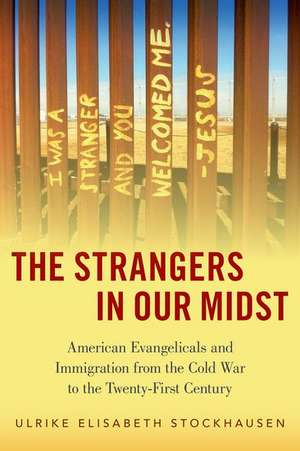The Strangers in Our Midst: American Evangelicals and Immigration from the Cold War to the Twenty-First Century
Autor Ulrike Elisabeth Stockhausenen Limba Engleză Hardback – 8 oct 2021
Preț: 559.97 lei
Preț vechi: 639.59 lei
-12% Nou
Puncte Express: 840
Preț estimativ în valută:
107.15€ • 112.27$ • 88.58£
107.15€ • 112.27$ • 88.58£
Carte disponibilă
Livrare economică 11-17 martie
Preluare comenzi: 021 569.72.76
Specificații
ISBN-13: 9780197515884
ISBN-10: 0197515886
Pagini: 344
Dimensiuni: 236 x 160 x 25 mm
Greutate: 0.66 kg
Editura: Oxford University Press
Colecția OUP USA
Locul publicării:New York, United States
ISBN-10: 0197515886
Pagini: 344
Dimensiuni: 236 x 160 x 25 mm
Greutate: 0.66 kg
Editura: Oxford University Press
Colecția OUP USA
Locul publicării:New York, United States
Recenzii
While the book illustrates the multiplicity of evangelical voices, and the contentiousness of the immigration issues, it also implicitly reveals what historian Mark Noll has called the "scandal of the evangelical mind".
The Strangers in Our Midst asks us to imagine a time when evangelicals saw immigrants not as foreigners to be deported, but as sojourners to be welcomed. This book is a probing account of evolving legal codes, migration patterns, and theological commitments, and Stockhausen is the expert guide who takes us from refugee camps in Southeast Asia to Southern Baptist pulpits in Alabama to the corridors of power in Washington. Exhaustively researched and lucidly narrated, this is an important book.
Based on robust research on American evangelical denominations, Stockhausen offers a much-needed look at the extensive Cold War era leadership of evangelicals in refugee resettlement and immigration work. She contends these efforts were driven by a common theology of hospitality held by evangelicals on the political right and the left. Post-Cold War, evangelical positions on immigration diverged for partisan and demographic reasons. Yet today, in spite of well-known divisions amongst evangelical laity regarding immigration, Stockhausen shows that significant sectors of white evangelical leadership, challenged by Latinx leadership, are beginning to re-converge on evangelicalism's historic emphasis on hospitality.
At a time when white evangelical Christians in the United States have become polarized over the issue of immigration, Ulrike Elisabeth Stockhausen's The Strangers in Our Midst provides a nuanced, balanced historical account of how we reached this point. Filled with perceptive insights and surprises, Stockhausen's analysis is essential for understanding why conservative white American evangelicals changed their views on immigration — and, in turn, changed American politics.
The Strangers in Our Midst asks us to imagine a time when evangelicals saw immigrants not as foreigners to be deported, but as sojourners to be welcomed. This book is a probing account of evolving legal codes, migration patterns, and theological commitments, and Stockhausen is the expert guide who takes us from refugee camps in Southeast Asia to Southern Baptist pulpits in Alabama to the corridors of power in Washington. Exhaustively researched and lucidly narrated, this is an important book.
Based on robust research on American evangelical denominations, Stockhausen offers a much-needed look at the extensive Cold War era leadership of evangelicals in refugee resettlement and immigration work. She contends these efforts were driven by a common theology of hospitality held by evangelicals on the political right and the left. Post-Cold War, evangelical positions on immigration diverged for partisan and demographic reasons. Yet today, in spite of well-known divisions amongst evangelical laity regarding immigration, Stockhausen shows that significant sectors of white evangelical leadership, challenged by Latinx leadership, are beginning to re-converge on evangelicalism's historic emphasis on hospitality.
At a time when white evangelical Christians in the United States have become polarized over the issue of immigration, Ulrike Elisabeth Stockhausen's The Strangers in Our Midst provides a nuanced, balanced historical account of how we reached this point. Filled with perceptive insights and surprises, Stockhausen's analysis is essential for understanding why conservative white American evangelicals changed their views on immigration — and, in turn, changed American politics.
Notă biografică
Ulrike Elisabeth Stockhausen received her PhD from the University of Münster, Germany. She works as the Digital Science Communication Officer at the Max Weber Stiftung - Foundation German Institutes in the Humanities Abroad in Bonn, Germany.
